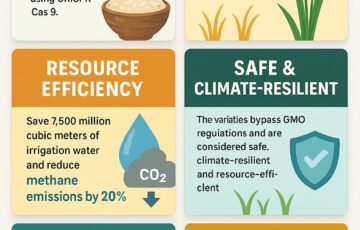Small Molecular Reactor (SMR) : Push for Clean Energy
Syllabus:
GS 2:
- Science and technology – Development and its application in everyday live.
- Life Science
Why in the News?
India’s focus on Small Modular Reactors (SMRs) aligns with its sustainable energy goals, offering a flexible, low-carbon nuclear solution. Recent government interest highlights SMRs’ potential for safely addressing India’s energy needs while supporting its climate commitments.
What is a Small Modular Reactor (SMR) ?
- Definition: Small Modular Reactors (SMRs) are advanced nuclear reactors with a power capacity of up to 300 MW(e) per unit, about a third of traditional reactors’ capacity.
- Low-carbon Energy: SMRs generate substantial amounts of low-carbon electricity, aligning with global clean energy goals.
- Small Size: Physically compact, SMRs occupy only a fraction of the space required by conventional reactors.
- Modular Design: Systems and components are factory-assembled and can be transported to the installation site as ready-to-use units, streamlining deployment.
- Energy Production: SMRs use nuclear fission to produce heat, which is then converted into electrical energy.
Advantages of Small Modular Reactors
- Low-carbon energy: SMRs have low carbon emissions, supporting India’s commitment to climate goals while addressing energy demand.
- Flexible deployment: Their modular design allows deployment across diverse locations, making them adaptable for India’s varied geographical and industrial
- Complementing renewables: SMRs can balance renewable energy’s intermittent nature, ensuring a stable and reliable power supply.
- Faster construction: The modular nature enables quicker construction timelines compared to large reactors, accelerating clean energy access.
- Enhanced safety: Smaller reactors reduce risks and complexities associated with large-scale nuclear power, promoting a safer nuclear landscape.
Need for Private Sector Involvement
- Efficiency boost: Private sector involvement could drive efficiency and innovation, enhancing SMR development timelines and technology.
- Atomic Energy Act revision: Amending the 1962 Atomic Energy Act can enable private firms to participate in India’s nuclear energy
- Strategic-commercial split: Separating strategic and commercial nuclear sectors may create distinct policies to regulate private entities in nuclear space.
- Public-private synergy: Collaborations with private players could foster technology transfer, enhancing domestic capabilities in advanced nuclear tech.
- Competitive advantage: Encouraging private firms in nuclear projects can boost competition, improving SMR infrastructure and service quality.
Safeguards Against Proliferation
- Proliferation resistance: SMRs should be designed to prevent nuclear material misuse, maintaining peace-oriented nuclear technology.
- Advanced reactor designs: Utilizing designs that hinder weapons-grade material production ensures SMR technology remains secure.
- Remote deployment safety: Enhanced safeguards are essential to prevent material diversion, especially in remote locations.
- IAEA collaboration: Working with the IAEA can ensure India’s SMR technology aligns with global non-proliferation standards.
- Sealed reactors: Implementing sealed and long-lifetime reactors may reduce proliferation risks, supporting secure SMR deployment.
Hydrogen Production and Desalination
- Hydrogen production: SMRs can produce clean hydrogen, advancing India’s low-carbon hydrogen objectives and providing an alternative to fossil fuels.
- Industrial synergy: Co-locating SMR facilities with industries can optimize hydrogen production and promote energy efficiency.
- Desalination solutions: SMRs can support desalination in water-scarce regions, addressing water demands alongside hydrogen production needs.
- Water management: Using SMRs for large-scale desalination can mitigate water scarcity, especially along India’s coastal areas.
- Low-carbon applications: SMRs offer sustainable solutions for industrial energy needs, promoting a resilient and eco-friendly industrial sector.
Nuclear Waste Management and Recycling
- Waste agency establishment: Setting up a National Radioactive Waste Management Agency can streamline SMR waste handling and public trust.
- Recycling initiatives: Investing in recycling efforts aligns India with international best practices, ensuring sustainable nuclear development.
- R&D investment: New SMR designs may require innovative waste disposal solutions, encouraging R&D in waste management.
- Safety practices: Existing practices for light-water SMRs can apply, with adaptations for alternative reactor types as necessary.
- Commitment to safety: Responsible waste handling reinforces India’s dedication to safe and environmentally responsible nuclear energy.
Nuclear Safety and Transparency
- Regulatory adaptation: Existing regulations must evolve to suit SMRs, ensuring safe and efficient reactor deployment.
- Dedicated SMR office: A Nuclear Regulatory Innovation Office can provide flexible policies tailored for SMR safety
- Public transparency: Open regulatory practices build public trust, enhancing acceptance of nuclear energy.
- Comprehensive safety: Developing SMR-specific safety assessments ensures adherence to robust standards in reactor design and operations.
- Community engagement: Transparent processes strengthen accountability, fostering public confidence in India’s nuclear energy
Conclusion
Small Modular Reactors (SMRs) hold promise for India’s sustainable energy future, bridging gaps in clean energy demand and supporting hydrogen production. Clear policies, private sector involvement, and robust safety measures can make SMRs a key part of India’s low-carbon pathway.
Source: Mint
Mains Practice Question
Examine the role of Small Modular Reactors (SMRs) in India’s clean energy strategy. Discuss the potential benefits and challenges associated with SMR deployment, focusing on regulatory, safety, and environmental considerations.






